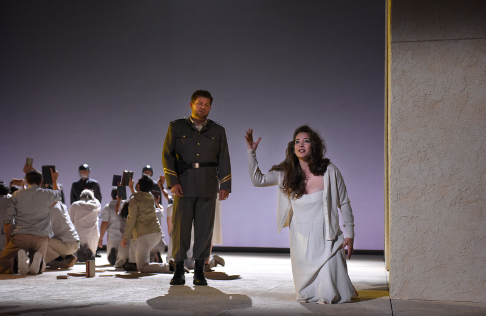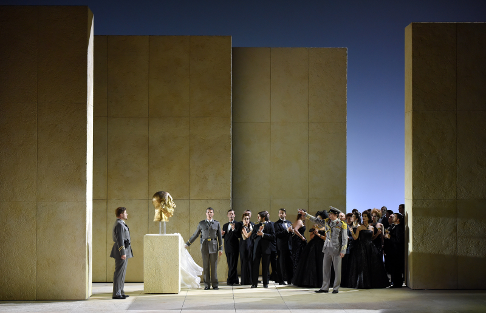21 Oct 2015
Theodora, Théâtre des Champs-Élysées
Handel’s genius is central focus to the new staging of Handel’s oratorio Theodora at Paris' Théâtre des Champs-Élysées.

Handel’s genius is central focus to the new staging of Handel’s oratorio Theodora at Paris' Théâtre des Champs-Élysées.
Opening October 10th, it features striking performances by acclaimed baroque specialist William Christie and his Les Arts Florissants and super-star counter-tenor Philippe Jaroussky, Handel certainly is worthy of this prime-time treatment and it is already a highlight of the new season.
With the coming holidays, Americans can hear Handel's Messiah almost everywhere: in concert halls, churches, shopping malls and even elevators. In my youth, I assumed he was a one-hit composer (well, two counting Water Music). I knew he had a long life and continued to compose until the end but always assumed that the "powers that be" knew that his other works deserved no particular attention.

In recent decades, however, this has changed for me and many others. Imaginative stagings and the Baroque revival, featuring music played on historically-informed instruments, have given new life Handel's many operas and oratorios and also revived interest in a large number of other long-forgotten composers. William Christie and his forces have already successfully staged this oratorio in Glyndebourne in 1996 with a popular and provocative staging by Peter Sellars. Christie recorded the work in 2000 and now opens the Théâtre des Champs-Élysées season with it. The oratorio tells the story with such detail that the border between opera and oratorio seems to have disappeared. The new production, also “modern dress,” focuses on the cast and chorus to clarify and ennoble the music of this tragic tale.
The British stage director Stephen Landridge, the new director of the opera of Göteborg, tells the story of Handel’s penultimate oratorio with a refreshing directness and clarity. Movable walls, which change color from the lighting, frame the action and the choir, often onstage, represent the public. The story of Roman legions moving against a Christian community in ancient Antioch features a young centurion who falls in love with a chaste, newly-converted Christian. When Roman forces move against the upstart “sect,” the conflicting emotions of the young officer, Dydime, sang with poise and arching beauty by Philippe Jaroussky, become central to the story.

In the title role, soprano Katherine Watson began appearing in public as part of Christie’s Jardin des Voix program for young singers in 2008 and, after appearing in several productions under his wing, is ready for the international stage. A voice which combines strength and shape, her Theodora has serious dramatic impact and beauty. Her friend and confident, Irène, sung by Stéphanie d’Oustrac, is also carefully realized and beautifully sung. d’Oustrac also began her career with Christie and now has a serious international career. A vibrant artist of sound, her performance compliments Watson’s engaging Theodora.
The Roman officer who tries to save Theodora, Didymus, was sung by the celebrated counter-tenor Philippe Jaroussky. While the voice seemed to have a bit less impact that in the past in this same theater, it retains the superb grace and beauty which took him to the top. This and his instinctive theatrical sense make him appealing as the Roman officer who questions the authoritarian state. As Valens, the Roman commander demanding obedience, bass Callum Thorpe performs with much barking and an often-distorted melodic line but the audience seemed to like his portrayal. Tenor Kresimir Spicer is more engaging as Didymus’ friend, Septime. One little complaint would be that the English text could have been more accurately expressed by the entire cast.
It is a tribute to William Christie’s decades of work in France that a Handel opera can open a season with five performances and have capacity audiences cheering. Some time ago there was an internet discussion of whether Handel should be considered at the level of Beethoven, Bach or Mozart, the top ranking of the pantheon of classical composers. The overarching beauty and brilliance of Theodora and its message of universal love and hope makes the case that Handel’s music for voice is a universal treasure that all music-lovers should well know.
Frank Cadenhead